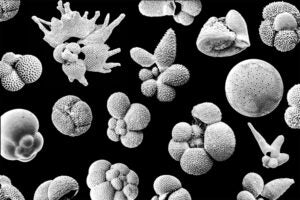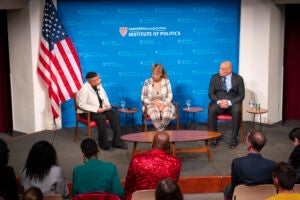Tag: Anthropology
-
Nation & World
New research challenges previous knowledge about the origins of urbanization
Ancient cities arose not by decree from a centralized political power, as was previously widely believed, but as the outgrowth of decisions made by smaller groups or individuals, according to a new study from researchers at Harvard University, the University of Cambridge, and the University of Edinburgh.
-
Nation & World
Scientists have something to chew on
In a groundbreaking study, two Harvard scientists have for the first time extracted human DNA from ancient artifacts. The work potentially opens up a new universe of sources for ancient genetic material, which is used to map human migrations in prehistoric times.
-
Nation & World
William White Howells
At a Meeting of the Faculty of Arts and Sciences on April 10, 2007, the Minute honoring the life and service of the late William White Howells, Professor of Anthropology, Emeritus, was placed upon the records. Howells is best known for his work on human cranial variation and the analytical use of multivariate statistical techniques.
-
Nation & World
Upon meeting a scholar of literature, one is likely to ask, “What period do you study?” with the likely answer being a fairly narrow slice of the literary pie — the 19th century novel, say, or nondramatic poetry of the Renaissance. With Panagiotis Roilos, however, the answer is not so straightforward.
-
Nation & World
Humans hot, sweaty, natural-born runners
Hairless, clawless, and largely weaponless, ancient humans used the unlikely combination of sweatiness and relentlessness to gain the upper hand over their faster, stronger, generally more dangerous animal prey, Harvard Anthropology Professor Daniel Lieberman said Thursday (April 12).
-
Nation & World
Modern Girl Project views women between the wars
When American women won the right to vote in 1919, the logical question was, What next? Suffragists had the answer ready: full enjoyment of civil and domestic life for women, equal to that of men. But suffragists found out that what was next was not much. It would be decades before American women gained anything…
-
Nation & World
Jane Goodall: A life in the field
As a girl in England, Jane Goodall had a toy chimpanzee named Jubilee — a harbinger of the primatologist she was to become and of the jubilant audiences that greet her at every turn in adulthood. Beginning in 1960, her groundbreaking studies of chimpanzees in the African wild led to a series of revelations that…
-
Nation & World
Seeing the forest, from the trees
Alain Houle thinks higher-status chimpanzees likely feed on more, higher-quality fruit — found higher up in the tree — than lower-status chimpanzees, which leads to the chimps being in better physical shape and greater breeding success. “I thought I’d be killed,” Houle said later. “They climbed up, looked at me, barked at me, and then…
-
Nation & World
Kwang-chih Chang
At a Meeting of the Faculty of Arts and Sciences on October 17, 2006, the Minute honoring the life and service of the late Kwang-chih Chang, John E. Hudson Professor of Archaeology, Emeritus, was placed upon the records. As a scholar and as a person, K.C. was an enduring source of inspiration.
-
Nation & World
Orangutan research yields conservation dividends
The population of the orangutan, one of humankind’s closest animal relatives, has declined with human expansion. The orangutan population declined by 97 percent in the 20th century and over 90 percent of their rainforest habitat has been destroyed. The factors contributing to that decline – illegal logging, conversion of forestland to agriculture, and hunting to…
-
Nation & World
Wakeley examines ancestral lines
John Wakeley is devising new ways to trace the evolutionary road taken by humans and the creatures with whom we share planet Earth by creating new models that examine how…
-
Nation & World
Blogging from the Ugandan forest
A Web log, or blog, co-written by Harvard researcher Ian Gilby, working in Uganda’s Kibale Forest, makes vivid the family lives of chimpanzees. The blog, on the Anthropology Department Web…
-
Nation & World
Memorial services
Memorial services for David Westfall, William W. Howells, and Marion R. Briefer
-
Nation & World
Ancient humans brought bottle gourds to Americas from Asia
Thick-skinned bottle gourds widely used as containers by prehistoric peoples were likely brought to the Americas some 10,000 years ago by individuals who arrived from Asia, according to a new…
-
Nation & World
Digging into Harvard Yard
It looks like the stuff any gardener might find while turning over a new tomato bed: rusty nails, chunks of glass, maybe a sprinkler head or two. But to these Harvard anthropology students, it is a potential gold mine of information.
-
Nation & World
Chinese salt evidence spared from flood
American and Chinese researchers digging at an imperiled site of ancient salt production found the earliest known evidence of salt manufacturing in China.
-
Nation & World
Is 7-million-year-old skull really human?
Who or what was Toumai? Those who found his skull in 2001 insist he is the oldest human ancestor, a small fellow who lived by an African lake some 7…
-
Nation & World
Human skull is 7 million years old
When a 7-million-year-old skull was first found, Daniel Lieberman, a professor of anthropology at Harvard, called it “one of the greatest discoveries of the past 100 years.” After studying new…
-
Nation & World
In China, gems used as tools millennia earlier than thought
Researchers have uncovered strong evidence that the ancient Chinese used diamonds to grind and polish ceremonial stone burial axes as long as 6,000 years ago – and incredibly, did so…
-
Nation & World
Man’s smartest friend
Anthropologist Brian Hare’s research involved New Guinea singing dogs, a subspecies that shows strong indications of domestication at some time in the past but now exists as feral, reclusive individuals…
-
Nation & World
Diminishing returns
Election Night is one of the increasingly rare moments when large numbers of Americans gather in front of their television sets to hear about politics. Although a comparison of the…
-
Nation & World
Blocking the road to extinction
A widely cited estimate is that at current rates of deforestation, orangutans will be extinct in the wild in 20 years. But Assistant Professor of Anthropology Cheryl Knott, who heads…
-
Nation & World
In their cups
Thomas Cummins, Dumbarton Oaks Professor of the History of Pre-Columbian and Colonial Art, has made a career of finding and interpreting objects that hold the key to a fuller understanding…
-
Nation & World
Undergraduates observe Rwandan attempts at justice
The Rwandan genocide memorial was a tiny one-room church, pervaded still by a penetrating stench. On a table in the church was a pile of human skulls and femurs, a…
-
Nation & World
Bringing back the ancient muses
The epic verse of Homer, the love poems of Sappho, the tragedies of Sophocles, and the comedies of Aristophanes – all were accompanied by music. Yet that music – its…
-
Nation & World
Ancient Chinese script rewrites history
“This is like the discovery of the Dead Sea Scrolls,” says Tu Weiming, director of the Harvard Yenching Institute, who has played a key role in the preservation of ancient…
-
Nation & World
Examining differing reproductive desires in Gambia
For men in rural Gambia, more than 15 kids are desirable. That’s double the number of children that women are actually delivering. The number may seem high to people in…


